Most of us can’t imagine a world where our doggy friend is not part of our lives, yet that is the very thing that every dog owner will need to face.
I have often wished that I did not have to say goodbye to my dogs, but I take comfort in knowing that their death was as peaceful as I could make it.
Many owners are uncertain whether their dog wants to die alone or with the comfort of their presence.
According to pack behavior, dogs do not want to be alone when they die. Well-loved dogs who trust their packmates, human and canine, find comfort in the presence of their packmates when they die. Abused dogs who’ve learned not to trust humans prefer to die alone, without human support.
Every dog owner understands that the joy of owning dogs is counterbalanced by the inevitable grief when they leave this world.
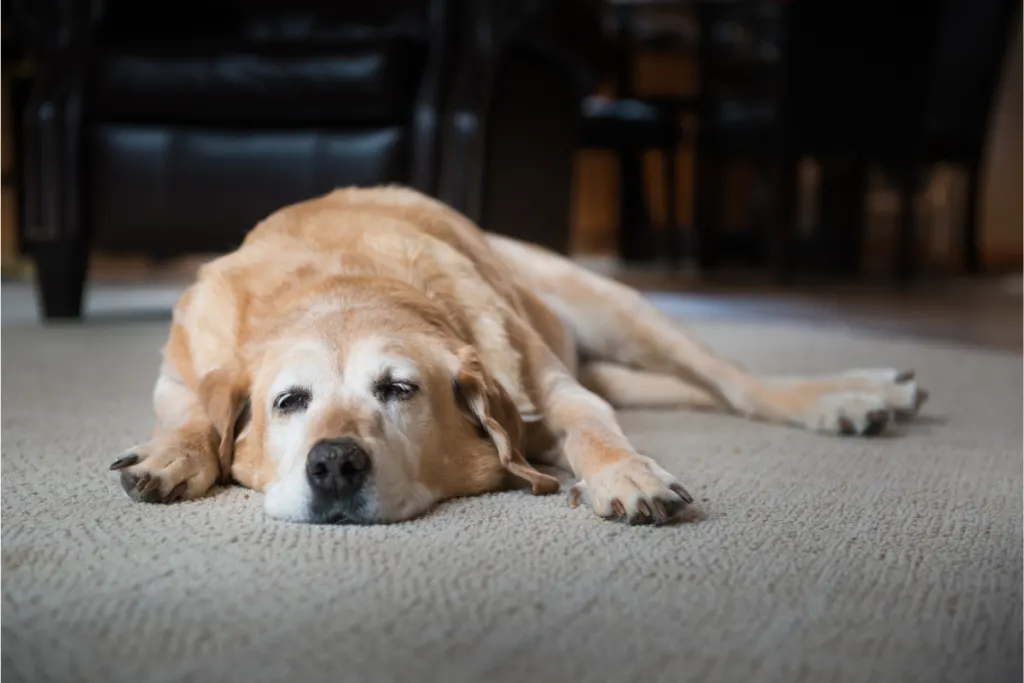
Orchestrating a peaceful passing for your dog is a heavy burden that is made easier if you are confident in your decisions.
One of the most difficult decisions to be made is whether to let your dog die alone or with the comfort of its human family.
Click Here to Jump to a Section
Do Dogs Want To Die Alone?
The question of whether dogs want to be alone when they die is not a straightforward yes or no. The answer largely depends on the cause of death and the dog’s relationship with people.
The Link Between Cause of Death And Dogs Need To Die Alone
Typically, dog deaths can be divided into three broad categories:
- Traumatic deaths, e.g., attacked by other dogs, hit by a car, killed by a bear, etc.
- Non-traumatic natural deaths, e.g., cardiovascular incidents, infectious disease, gastrointestinal complications, etc.
- Euthanasia, i.e., a human orchestrated assisted death.
Traumatic deaths are generally accompanied by heightened stress levels and an intense fight or flight instinct. Once the “fight” part is over, the injured dog may attempt to flee to safety.
During these moments of flight, it can be difficult for a frantic owner’s voice to penetrate the dog’s panic-stricken mind; many owners mistakenly assume their dog wants to die alone.
However, during this panic-fueled flight, your dog reacts on instinct and is not consciously choosing to die alone. If the dog calms down before dying, the dog will draw comfort from your presence.
Unlike euthanasia and non-traumatic natural deaths, there is no way to plan for a traumatic death. The nature of traumatic deaths means that it’s a sudden, unexpected end to your dog’s life, and the best you can do at the moment is offer as much comfort as you can to your dying dog.
Dogs dying from trauma will have severe catastrophic wounds. While your injured dog may not be able to accept petting or hugs, they will nonetheless appreciate hearing you talk to them in a calm, soothing voice.
Dogs Who Don’t Trust People Want To Die Alone
Perhaps more importantly than the cause of death is the dog’s relationship with people.
Dogs who have been abused or hurt by people may become frightened if people try to comfort them when they are dying. These dogs do not trust people, and their distress will be heightened by the presence of humans during their death.
Dogs Who Trust People Don’t Want To Die Alone
Veterinarians have reported that pet dogs brought in for euthanasia become anxious and distressed when their owners leave the room.
Below is a writing from a veterinarian that has made the rounds on social media. It is a compassionate plea for all dog owners to rise to the occasion when their dog needs them the most:
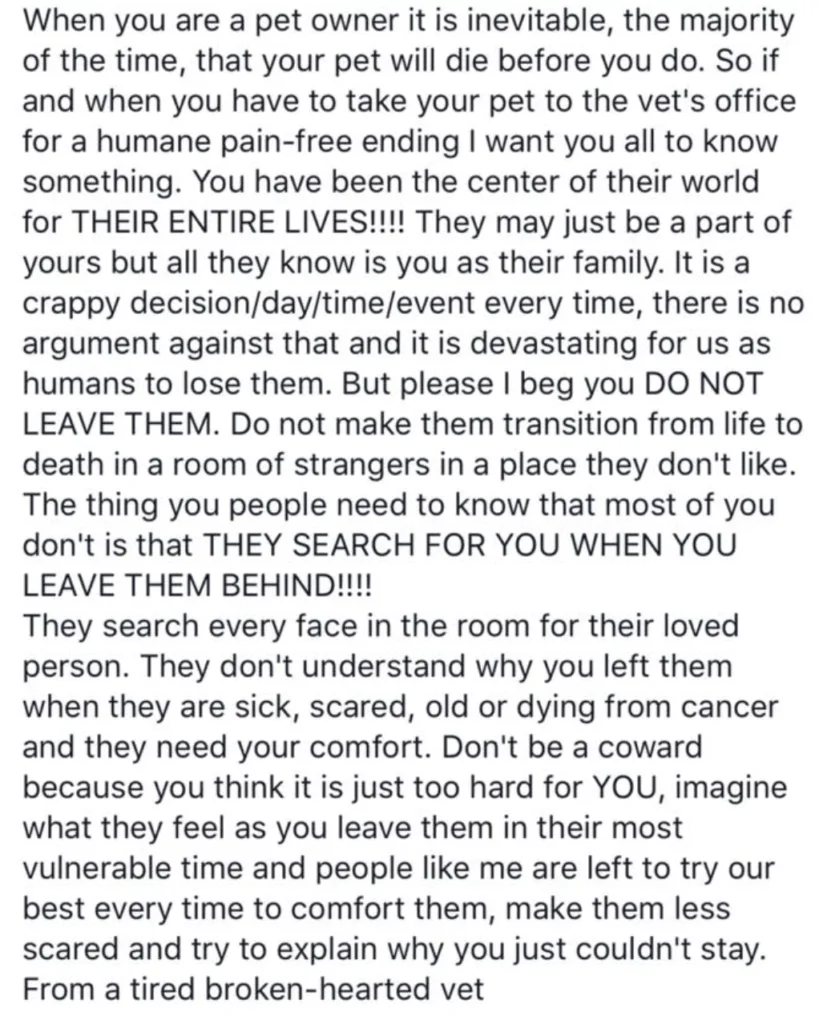
While the veterinarians and veterinary staff are trained to help keep dogs calm during euthanasia, they cannot replace the dog’s beloved owner.
Well-loved dogs have developed a lifelong habit of looking to their owners for comfort and assurance in scary situations; this habit won’t be broken during their final hours. These dogs do not want to die alone and draw comfort from “their” humans.
Where did The Myth That Dogs Want To Die Alone Originate?
For many years, two schools of thought perpetuated the myth that all dogs want to die alone.
The first justification for the belief that dogs want to die alone lies in the behavior of old dogs. Many people cite instances where old dogs wander off and explain the behavior as “the dog’s desire to die alone.”
The second justification is based on the assumption that wolves leave a pack to die alone.
Most people readily accept the statement “survival of the fittest.” The all-encompassing nature of this statement underpins the belief that there is no room for old, sick, or injured animals in the world of wild animals.
People believe that injured and weak animals hide to “lick their wounds” privately. These people will often use the behavior of wild wolves to support their argument on why dogs want to die alone.
If An Old Dog Wanders, Do They Want To Die Alone?
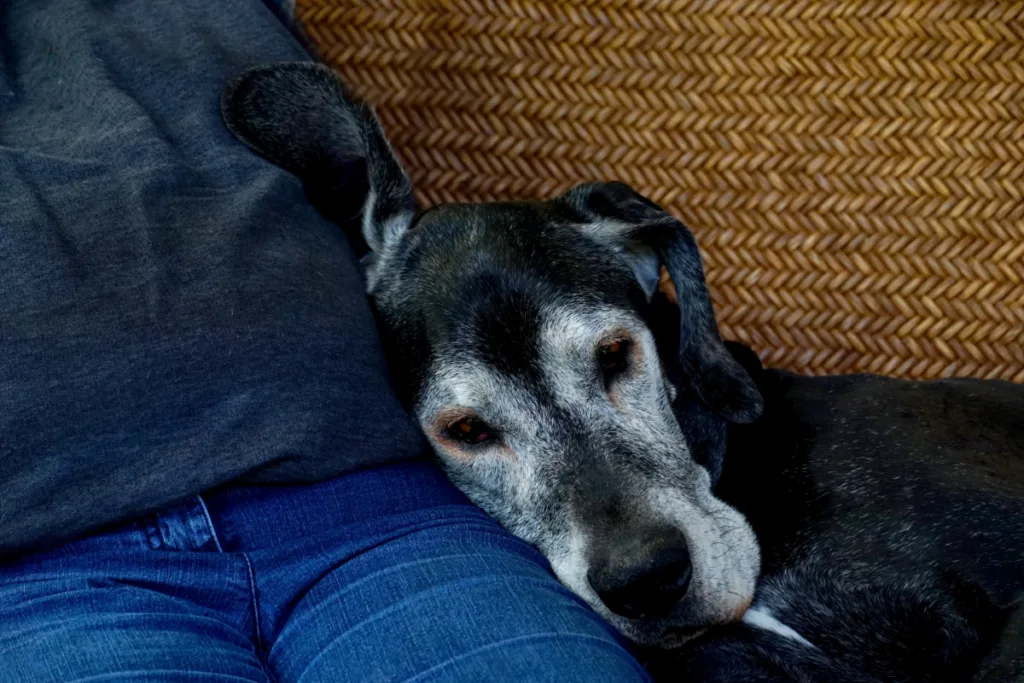
As previously stated, many people point to the wanderings of old dogs as evidence that dogs want to be alone when they die. However, veterinary science provides a different explanation for this behavior.
Many neurological diseases affecting dogs cause changes in the dog’s behavior. These changes include:
- Increased anxiety and fear that may cause the dog to hide or run away.
- Decreased sociability.
- Confusion and disorientation leading to the dog wandering off and becoming lost.
One of the most common neurological pathologies affecting senior dogs is canine cognitive dysfunction syndrome (CCDS). CCDS is the dog equivalent of human dementia.
As veterinary care improves, more dogs live longer, which has led to an increase in the number of dogs diagnosed with CCDS.
- 22.5% of dogs 9yr to 11yr old have CCDS.
- 28% of 11yr to 12yr old dogs are diagnosed with CCDS.
- 68% of 15yr to 16yr old dogs have CCDS.
The symptoms of CCDS vary between dogs, depending on which parts of the brain are affected. However, many of these dogs show increased confusion and anxiety as the disease progresses.
Dogs with CCDS show atypical behavior, including wandering away from their home and property.
Like a person with dementia that gets lost, these dogs are not leaving to die alone; rather, the dogs are lost and need help finding their way home.
A dog with CCDS should be carefully watched and never allowed outside without supervision. Eventually, the dog’s quality of life will decline to the point that the veterinarian recommends euthanasia for the dog’s sake.
Do Wolves And, By Implication Dogs, Want To Die Alone?
Nature is a brutal mistress, and wolves were considered her handmaiden; ruthless, vicious, without mercy. However, decades-long observation of wolf pack dynamics has challenged this belief.
For over two decades, Jim and Jamie Dutcher have documented the lives of wolves living in Yellowstone and central Idaho.
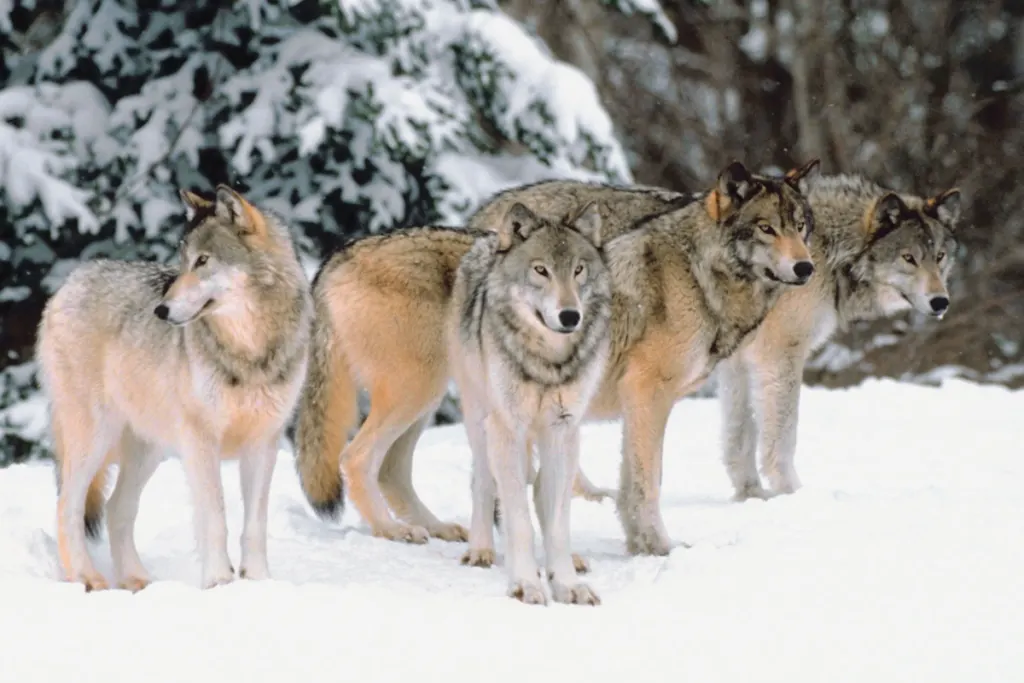
Their faithful recording of the wolves’ daily lives has revealed fascinating insights into pack dynamics and death behavior.
Do Wolves Abandon Fatally Injured Wolves?
In the simplest of terms, wolf packs function like family units; they share the pack responsibilities between the members and value each packmate as a vital part of the pack.
Theoretically, “survival of the fittest” implies that fatally wounded wolves should leave the pack and hide until death takes them, but this behavior is surprisingly rare.
Wolf packs actively care for sick and injured wolves; in many cases, the pack’s nursing is successful, and the injured wolf recovers.
An Alaskan biologist found evidence of a male wolf whose jaw had been broken. A wolf who cannot hunt or chew is essentially as good as dead.
However, instead of going off to die alone, this wolf’s packmates regurgitated partially digested food for the impaired wolf.
Eventually, the “fatally” wounded wolf made a full recovery and lived for many more years because his packmates did not leave him to die alone.
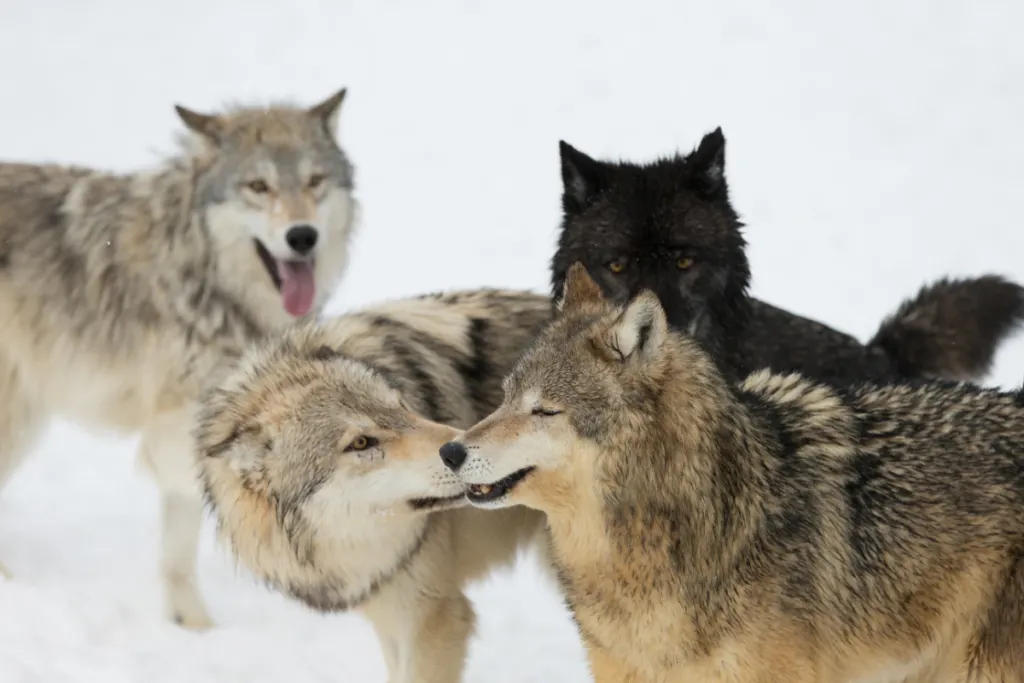
Another account documents the heroic behavior and death of an alpha male. When a rival pack attacked the male’s pack, he turned and fought the attacking wolves, giving his pack time to run to safety.
Victorious but mortally wounded, the male hobbled after his pack before collapsing in the snow. His pack returned and cuddled next to the older wolf until he passed.
The Dutcher’s have witnessed many instances of wolves caring for injured or dying packmates. When wolves die, they stay with their packmates and appear to draw comfort from the presence of their pack.
Do Dogs Leave Other Dogs To Die Alone?
Dogs are individuals, and their reactions to death vary. The way a dog reacts to the passing of another dog is dependent on their:
- Personality
- Bond with the dying dog
Some dogs react with disinterest or fear when encountering a dead dog, whereas other closely bonded dogs choose to stay with their dying friend.
Packbonds Influence Whether A Dog Will Comfort A Dying Dog
I recently spoke to an owner about her experiences with dogs reacting to their dying packmates.
She runs a multi-dog household, and her answer revealed pertinent details about how the individual dog’s personality and pack bonds affect how the dog reacts to the death of a packmate.
Dogs Are Willing To Abandon A Dying Dog They Do Not Know
In the first story, she relates how she taught her German Shepherd to track and find lost dogs. On one such occasion, the dog tracked a Bloodhound who had disappeared earlier in the morning.
Eventually, the German Shepherd found the Bloodhound, dying from Biliary.
The Bloodhound was saved (he’s still alive today), but the German Shepherd’s reaction to the dying dog was extreme anxiety and a strong desire to leave the area.
The German Shepherd and Bloodhound were not packmates, and the German Shepherd had no desire to stick around the anxiety-provoking situation of a dying dog.
Dogs Won’t Abandon A Dying Packmate
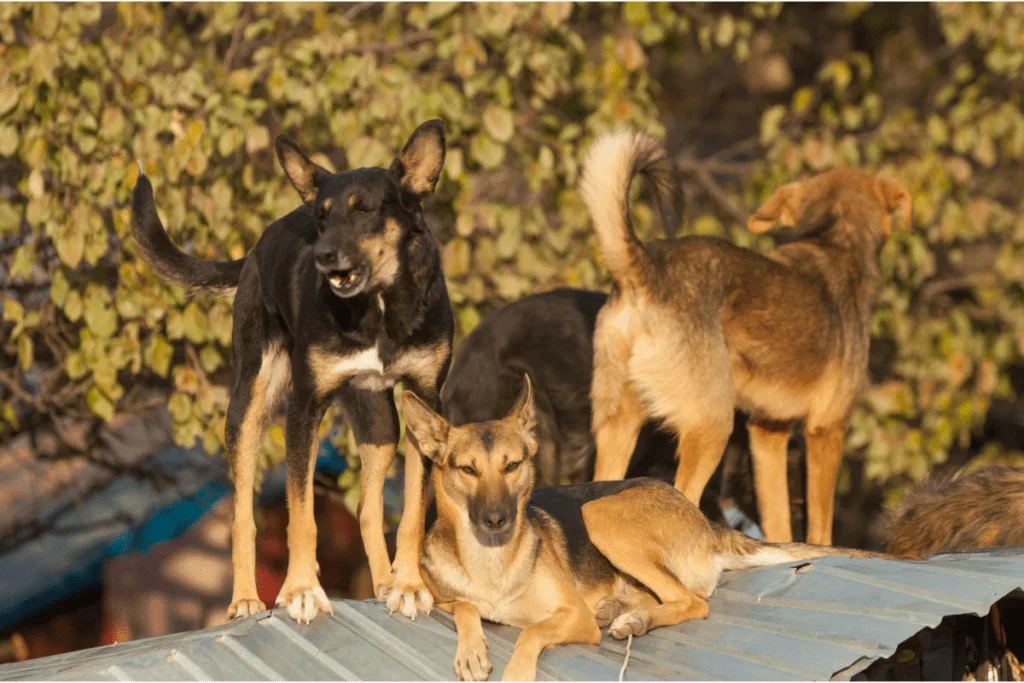
A few years later, she encountered the complete opposite of her German Shepherd.
A mother and daughter pair of English Cocker Spaniels were playing in a secure field, chasing birds, digging holes, and generally having fun.
When the mother collapsed and lay dying from a stroke, the daughter immediately moved to comfort her mom.
The little dog refused to leave her mother’s side for hours and eventually had to be carried inside so that the mother’s body could be buried.
The mother and daughter duo were closely bonded and did everything together, evidenced by the daughter’s refusal to leave her mother’s side.
Newsworthy Loyal Dogs Who Refused To Leave A Dying Friend
The story of the little English Cocker Spaniel is not unusual. Like wolves, dogs form strong bonds with packmates that supersede the bounds of death.
Closely bonded dogs often refuse to abandon their dead and dying packmates, indicating that dogs do not want to die alone.
Dogs who won’t leave their dying canine friend frequently make news headlines for their persistent, heart-breaking loyalty:
- 2015, a Great Pyrenees male refuses to abandon his friend who was hit by a car.
- 2022, Kaya, a female Great Dane female wouldn’t leave the grave of her best friend Gasper, a male Great Dane.
- 2015, Chihuahua tries to comfort his dying friend after she was hit by a car.
- 2020, Catahoula mix male won’t leave his dying female dog friend.
Do Dogs Leave Human Owners To Die Alone?
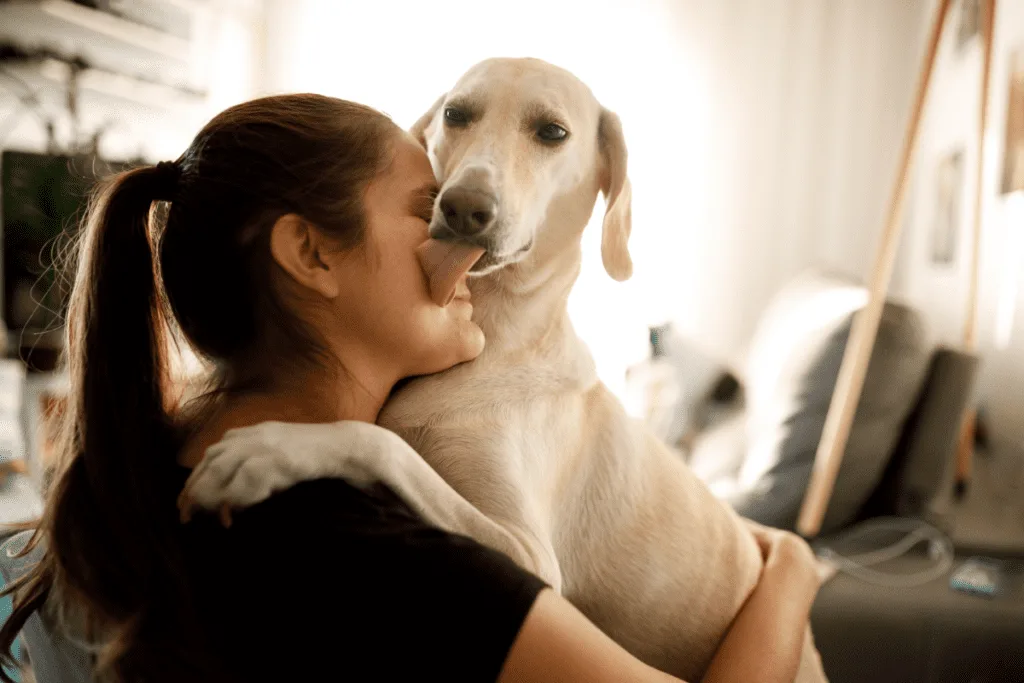
Perhaps the most significant clue to whether dogs want to die alone or in the company of their beloved humans can be inferred from how they react when the human they love dies.
In December 2016, Mistle, a springer spaniel, went for a walk with her owner. During the walk, her owner slipped and fell. Mistle sat with her dying owner for five hours before rescuers found the pair.
In 2021, David Deshon’s car became stuck in a snowdrift, and the 69yr old man attempted to hike to his nearest neighbor for help. With him were his two dogs, Baby Dog and Buddy.
Days later, David’s body was found, and guarding his body was Baby Dog. The severe weather conditions proved fatal to David, but his loyal canine remained with David during and after his death.
In both cases, family members commented that it was comforting to know that their loved one did not die alone.
We cannot ask dogs if they want to be alone when they die. However, if dogs refuse to leave their dying packmates, human or canine, don’t you think that they might want the comfort of their packmates when they die?
Final Thoughts
Dogs are the sunshine that makes us smile. But with the privilege of dog ownership comes the responsibility of ensuring their last days are happy and that their death is painless and stress-free.
Dogs who have been abused or hurt by humans might become distressed if a person were to try to comfort them during their death.
The kindest death for these scared dogs is to give them a quiet place to rest and leave them undisturbed as they die.
By contrast, dogs from loving families will take comfort from their human and canine packmates. These well-loved dogs will be calmer and less stressed if they know they are not alone when they die.
